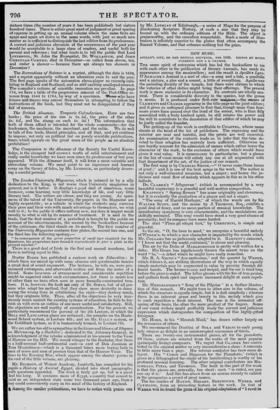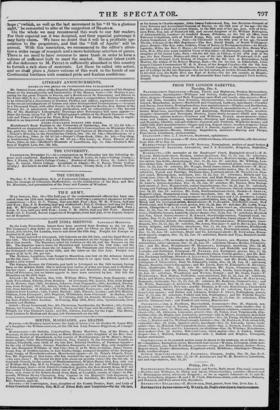NEW MUSIC.
APOLLO'S GIFT, OR THE MUSICAL SOUVENIR, FOR 1830. EDITED By MUZIO CLEMENTI AND .1. B. CRAMER.
THE same spirit of enterprise which has led the booksellers to vie with.each other in the publication of literary Annuals, has made its appearance among the musicsellers ; and the result is Apollo's Lyre, D'ALMAINE'S Annual is a sort of olio—a song and a tale, a quadrille and a picture, a glee and a sonnet, a little of everything. Apollo was the presiding divinity of the temple, but there were shrines to which the votaries of other deities might bring their offerings. The present work is more exclusive in its character. Its contents are wholly mu- sical. There is considerable diversity in the species, but the genus is music. It is produced under firgt-rate"auspmes,—the •names of CLEMENTI and CRAMER appearing in the title-page as the joint editors; and it gives us unfeigned pleasure to find that, though more than four- score years have passed over the head of the senior, who is thus fitly associated with a truly kindred spirit, he still retains the power and the will to contribute to the decoration of that edifice of which he may be justly called the founder. THE same spirit of enterprise which has led the booksellers to vie with.each other in the publication of literary Annuals, has made its appearance among the musicsellers ; and the result is Apollo's Lyre, D'ALMAINE'S Annual is a sort of olio—a song and a tale, a quadrille and a picture, a glee and a sonnet, a little of everything. Apollo was the presiding divinity of the temple, but there were shrines to which the votaries of other deities might bring their offerings. The present work is more exclusive in its character. Its contents are wholly mu- sical. There is considerable diversity in the species, but the genus is music. It is produced under firgt-rate"auspmes,—the •names of CLEMENTI and CRAMER appearing in the title-page as the joint editors; and it gives us unfeigned pleasure to find that, though more than four- score years have passed over the head of the senior, who is thus fitly associated with a truly kindred spirit, he still retains the power and the will to contribute to the decoration of that edifice of which he may be justly called the founder. The getting-up of the work is creditable to CHAPPEL, whose name stands at the head of the list of publishers. The engraving and the exterior are neat and tasteful, and the prints are well executed. An examination of the contents leads us to infer that the time de- voted to their selection has scarcely been sufficient. Otherwise we can hardly 'account for the admission of names which rather lower the character of the work, to the exclusion of others which would have given it real value. It is unnecessary to particularize, but a glance at the list of vocal music will satisfy any one at all acquainted with that department of the art, of the justice of our remark. The first song is by CHARLES SMITH,--" 0 never name those hours of grief;" and it is one of the best songs in the work. The author is not only a well-educated musician, but a singer ; and hence the ju- dicious and vocal flow of melody which appears in this as in his other ballads.
Dr. CLARKE'S " Athgarvan ". (which is accompanied by a very beautiful engraving) is a graceful and well-written composition.
KNAPTON'S "Spring flowers" has some originality and cleverness, but it is evidently the production of a player and not a singer. "The song of Harold Harfager," of which the words are by Sir WALTER SCOTT, and the music by J. THOMSON, Esq., exhibits a good deal of fancy, and no mean portion of musical knowledge. The introductory symphony is very characteristic, and the modulations are skilfully managed. This song would have stood a very good chance of popularity, had its compass been more limited. The duet "Placa gli sdegni tuoi," by CHERUBINI, is simple and graceful. In the air, "0, the hour to meet," we recognize a beautiful melody of WEnsues, to which a new character is imparted by the words which Mr. COLLARD has so judiciously adapted to it. BARNETT'S canzonet, "I know not that the world contained," is clever and pleasing.
The air by the Duke of MARLBOROUGH is pretty well written for a duke. His Grace has injudiciously thrown the accent twice on the word " to,"—a defect which he might have easily remedied. Mr. R. A. SMITH'S "Ave santissima," and the quartet by WERE% which follows it, are striking illustrations of the way in which equally simple materials may be augmented in value by passing through dif- ferent hands. The former is easy and insipid, and the ear is tired long before the piece is ended. The latter gleams with the fire of true genius, and gathers fresh spirit and imparts increased delight at each repeti- tion.
Mr. MENDELSSOHN'S " Song of the Pilgrim" is a farther illustra- tion of this remark. We might turn to other airs in the volume, of which the structure is equally simple, but it is dull simplicity ; whereas there is an inherent grace and beauty in this melody which give to each repetition a fresh interest. The one is the animated off- spring of the brain, the other the mere product of the fingers. Some of our vocal writers might profitably study the correct and judicious expression which distinguishes the composition of this highly-gifted foreigner. Mr. HORN, in his "Moorish Maid," has drawn rather largely on the resources of others.
We recommend the Duettini of SOLA and VERINI to such young lady singers as delight in an uninterrupted succession of thirds. There are twenty-one instrumental pieces, all for the pianoforte. Of these, sixteen are selected from the works of the most popular (principally living) composers. We regret that CLAMER has contri- buted to the original matter so very inconsiderable a share: it amounts to little more than a page. His veteran coadjutor has been snore di- ligent. His "Canon and Diapason for the Pianoforte," (which is given in a lithographed fac-simile of his handwriting) is worthy of his profound musical learning. The other original contributors are Mo- se HE E s, Pros, and THOMSON. The fault in this part of the work is that the pieces are, generally, too short : each "is ended, ere you can say it is.- And this has arisen from an unwise anxiety to exhibit in the prospectus a crowd of great names. The fac-similes Of HAYDN, 11,10ZART, BEETHOVEN, WEBER, and CLEMENTI, form an interesting feature in the work. In that of .WEJJElt will be found the germ of his original adaptation of "1 revel in hope ;" ;which, as well as the last movement in his "0 'tis a glorious sight," he consented to alter at the suggestion of BRAHAM. On the whole we may recommend this work to our fair readers. For their especial use it was designed, and their especial patronage it may fairly claim. We have no doubt that it will be a profitable spe- culation to the proprietors, and that the "Gift of Apollo" will be annual. With this conviction, we recommend to the editor's atten- tion a wider range of research and a more fastidious selection of pieces. There is no need to have recourse to mere trash in order to form a volume of sufficient bulk to meet the market. Musical talent (with all due deference to M. Fans) is sufficiently abundant in this country to furnish a rich store of materials. Let these be called into action, and we shall place a future volume of this work in the hands of our Continental brethren with unmixed pride and fearless confidence.



















 Previous page
Previous page